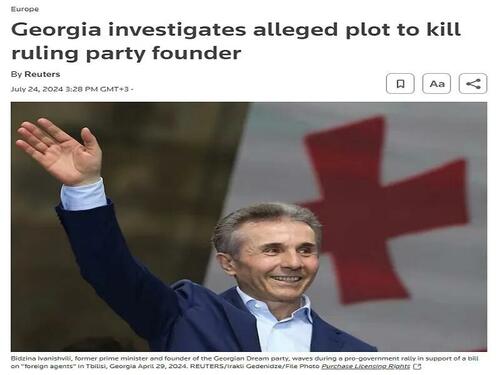Georgia Is The Next Country That Might Face A High-Profile Assassination Attempt
Authored by Andrew Korybko via substack,
Georgia’s State Security Service (SSS) informed the public that they’re investigating a criminal group linked to the former government which plotted to assassinate the founder of the ruling Georgian Dream party. According to RT, Prime Minister Irakli Kobakhidze claimed that these are the same forces that were behind the attempted assassinations of his Slovak counterpart Robert Fico and former US President Donald Trump, while Politico cited local media to report that the Georgian Legion is under suspicion.
It was explained in early May why “The Georgian State Security Service & The Georgian Legion Are On The Brink Of War”, namely because that pro-US armed group can play a crucial role in catalyzing a spree of urban terrorism ahead of, during, or right after fall’s parliamentary elections. The preceding analysis followed the failed attempt by rioters to storm the parliament over a week prior in protest of their country’s FARA-inspired foreign agents legislation, which readers can learn more about here.
In brief, although the ruling conservative-nationalist party aspires to join the EU and NATO, it doesn’t want to surrender the country’s sovereignty to the West in exchange and that’s why it’s been targeted for regime change over the past year and a half. The replacement of Georgian Dream with Western puppets would lead to “NGO”-propagated liberal–globalist values destroying their traditional society, hence the need for the foreign agents law, but there are also geopolitical consequences too.
The authorities warned last year that the prior attempt to overthrow them was aimed at opening up a second front against Russia, while there’s also the chance that a puppet regime would allow Georgia to be used by NATO to send more armed aid to Armenia in preparation of another war against Azerbaijan. Georgian Dream wants to stay out of all regional conflicts, so much so that it hasn’t even sanctioned Russia, which is yet another argument against their continued rule from the West’s perspective.
Speaking of Russia, its foreign intelligence service released a statement in early July warning that the West is preparing to exploit fall’s parliamentary elections as the pretext for another regime change attempt, and it’s possible that they shared information about this with their Georgian counterparts. That could explain why the local media cited by Politico said that some Georgian Legion members have been detained for questioning, while their leader claimed that 300 others have been added to the wanted list.
Although comparatively small in number, this pro-US armed group could play a similar role in Tbilisi later this year as the Azov Battalion did in Kiev a little more than a decade ago during “EuroMaidan”, which was explained in the earlier hyperlinked analysis about why they’re on the brink of war with the SSS. The most effective “Democratic Security” policy that Georgian Dream can promulgate right now is banning the Georgian Legion as a terrorist group if the ongoing investigation ties them to the assassination plot.
Allowing them to continue operating inside the country with impunity would constitute an enormous risk to Georgia’s national model of democracy considering the likelihood that they’ll catalyze a spree of urban terrorism ahead of, during, or right after the upcoming elections at the US’ regime change behest. Cracking down on this group ahead of the vote would greatly neutralize their ability to disrupt the democratic process and make associated Hybrid War threats much more manageable for the authorities.
Aware that the window of opportunity for destabilizing their country might soon close, the Georgian Legion might desperately try to carry out a high-profile assassination attempt in the near future, even if it isn’t against the ruling party’s founder but someone else like the Prime Minister and they use a patsy instead of their own members. Everyone should therefore keep a very close eye on Georgia since it’s still a major New Cold War battleground given its geostrategic significance in the broader region’s dynamics.
Tyler Durden
Fri, 07/26/2024 – 02:00


Recent Comments